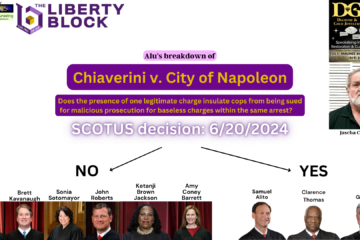Since the State of New Hampshire lifted the prohibition on police utilization of automatic license plate readers (LPRs) in the course of standard procedure (without obtaining warrants), the Liberty Block has published an article on the matter. The article explained why the people of New Hampshire should vehemently reject and condemn these Orwellian devices. The articles explain why the new surveillance program being adopted by local police departments in New Hampshire violates both the ‘unreasonable searches and seizures’ clause of the 4th amendment to the US Constitution and the ‘due process’ clause of the 5th amendment to the US Constitution. Additionally, the articles explain that these automatic cameras violate both the natural right to freedom from government and the natural right to privacy from government (the second of which was ratified by the people of New Hampshire and added to the State Constitution on November 6th, 2018).
However, the cameras remain, and an increasing number of police departments in New Hampshire are preparing to implement the new surveillance program in the coming years. As such, we feel that it is our duty to explain just how easy this program makes it for police officers in New Hampshire to stalk, harass, and abuse citizens. Even if all police officers only used the cameras to arrest those who appear to have warrants, the program would still violate the Constitution and increase the likelihood of horrific cases that result in innocent people spending days in jail for no reason. Keep in mind that if police mistake you for another person and you resist their attempt to arrest you, you are likely to be killed on the spot.

Last year, the Lincoln Police Department began to use a vehicle-mounted license plate reader. Every single time a license plate comes into the camera’s view, it is scanned and run against state and/or federal license plate databases. The time and location are included in this swift investigation. How many license plates could each of these super-cameras scan and investigate? Over 1500 per minute, according to ValleyNews.com. Vermont adopted the program a few years before New Hampshire did. Utilizing only 61 LPRs, cops in Vermont legally (read: illegally) scanned over 7.9 million license plates (of drivers who committed no crimes) over the 18-month period that VPR looked at. Ironically, “…the systems were helpful in solving fewer than five crimes in 2013.”, according to VPR.
Shortly after the town of Lincoln, NH implemented the program, the town of Sunapee, NH adopted the perpetual surveillance technology, as reported by WCAX.com. The article reports that Chief Cahill of the Sunapee Police Department helped to craft and testified in favor of the bill which removed the prohibition on LPR use by police. It seems that multiple NH departments plan to implement LPRs in the near future.
When asked about the LPRs, Allen Gilbert, ACLU Director of Vermont said “A citizen’s right to privacy is violated whenever a government records movements of individuals who are not subjects of an investigation.” and “After a while, a whole series of bits of information about us can paint a pretty detailed picture of where we’ve been.”
CityLab.com reported on the utilization of LPRs by police: “In a nutshell, it’s like face recognition—except every single face comes in a standard format and is directly linkable to a government identity record,” Alvaro Bedoya, the executive director of the Center on Privacy and Technology at Georgetown Law, said via email. “It allows mass tracking and because plates are issued by the government, we’re a bit desensitized to the idea that they’ll be tracked. It’s powerful stuff, and it’s not under control.”
As we mentioned above, the LPRs conduct a rapid, automated investigation of every single license plate – even those on parked cars – and record the time and location of the event. While the Lincoln police chief assured the public that the data would only be kept on file for 3 minutes (as per state law), some people may not trust the police chief who was suspended for allegedly releasing sensitive data shortly after he made this guarantee. Additionally, many New Hampshire residents may be cautious about giving police more surveillance power despite the Laurie List (the Attorney General’s secret list of ‘untrustworthy’ NH cops) growing and remaining extremely suspicious. Furthermore, many people may hesitate to trust every police officer with such private information due to the many times cops have violated that trust in unethical and violent ways.
Think about it: Once a few LPRs are used by police in NH, police may have access to data showing our exact routines, since each scan is stamped with the time, location, and license plate. Do you trust every cop in the state with the knowledge of every time you go to and from work? Knowing how many cops throughout the US have stalked and/or raped women, do you believe that it’s prudent to give cops the ultimate stalking tool? Currently, there are over 150 cops in New Hampshire who are so dishonest and/or unethical that even their own chiefs placed them on the semi-redacted list only available to the Attorney General. Think of your wife, your children, your friends, and yourself. Do you want cops knowing what time they come home from work? Do you trust cops with your daughter’s Friday evening routine? I sure don’t.
Do all police officers and departments in New Hampshire support the police stalker program? While we can’t say definitively that every cop in the state is eager to use this tool to stalk and/or assault individuals, we can report that not a single police officer or police department has condemned the program, to our knowledge. No department has even hinted that they would not implement the program in the future. We can safely say that police in New Hampshire seem to fall into one of two groups: Stalkers and enablers.
It gets worse: If a cop does pull over and assault a pretty teenage girl that they’ve been stalking, it is technically illegal for her or anyone else to use physical force against the cop. Police have 100% discretion and can arrest and even punish anyone they want. An individual could take the cop to court after the fact (if they have the time and money) and hope that a city judge and city cop are not buddies (they are coworkers, and may, in fact, be buddies). Keep in mind that judges and prosecutors are extremely biased in their strong support for police. Prosecutors didn’t even charge this cop who killed a stationary biker while typing on his laptop while driving. A judge ensured that Mitch Brailsford received no punishment after he murdered Daniel Shaver, an innocent man travelling on business. Infinite examples of this collusion are evident all over the US.
The unfortunate truth is that police officers are part of the ruling class and we are simply the peasants. They can seemingly do anything, and we are but helpless victims, alive and free only at their discretion.
Maybe cops are just trying to keep us safe, though. Assuming that all cops are benevolent angels determined to keep us as safe as possible, what technology will they utilize next to help them monitor and protect us in our homes?


